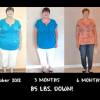Search the Community
Showing results for 'alcohol'.
Found 17,501 results
-


Sudden stop in weight loss with low calorie intake.
Fiddleman replied to Ms skinniness's topic in WLS Veteran's Forum
I try and eat about 1200 calories a day on cross fit day and 900 a day on running day. For example, I ate 7 x: 1. Protein shake with chia seeds (100 cal), 2 energy squares (120 cal). 2. 3 oz Protein (120 cal) 3. 3 oz protein, 2 oz veggie (150) 4. 2 energy squares (120 cal) 5. 1 AMRAP bar (300 cal) 6. 5 oz protein, 2 oz veggie (200) 7. 10 oz protein shake (100) Total: 1210 I have gone the last 2 months with my weight staying pretty constant @ 190 since adding daily creatine and 10 lb of lean muscle after reaching gol in February 2013. As for stalls, one day up 2 lb, another day down 2 lb. However, yesterday was a big drop of 5 lb overnight after my weight went up 5 lb from a Cinco de Mayo drink session (2 margaritas) and 2 glasses of a full Chardonnay the day before that. I ran long on may 5th and for an hour on may 6th. Women have to deal with TOM, but men have to deal with Water retention due also. as for alcohol, i am going to cut down the intake because it does mess with your weight and water retention. It also does not help when needing to run or do a WOD. Now it is about 2x a month except for the last weekend. I drink about 1.5 gallon a day. However, I want to cut down my water drinking after dinner so I am not up 3-4 x a night in the bathroom.the chia seeds help tremendously with retaining water in the GI tract for when it is needed during working out. The Aztecs really knew what they were doing when eating a handful chia seeds before running 100 miles in the Andes.just remember to drink enough of water before and father to support the internal water retention of his sees. I always drink at least 40 oz first thing in the morning an hour before the seeds and then drink water all day long. -
My husband has gastritus (not banded). The causes of his gastritus are the foods he eats & stress. He shouldn't have spicy foods, alcohol or stress or his stomach hurts and he gets an ulcer that acts up and bleeds a little. He is on Acephex and it helps a lot. He only takes it when his stomach is bothering him and then it heals up and he doesn't need medicine anymore. Maybe its something your eating. Do you eat spicy foods???
-


If you had your first alcholic drink...
Maddysgram replied to finallytime's topic in POST-Operation Weight Loss Surgery Q&A
My Dr. said no alcohol for 6mths after banding , and then just wine. No more Rum & D.Coke -
w/the band! Since cutting out alcohol and other empty calories AND exercising every day, I have now lost two pounds in the last four days. Yes, this band really does work when you work with it! :tongue_smilie: I almost don't feel like I really NEED my 3rd fill that I have scheduled for Monday (I scheduled it when my weightloss had stalled), but I know I could still use at least a small fill. I'm not at my sweet spot, but I can tell that I am not that far away from it either. :thumbup: For example, I can eat a fairly large portion right now, but I can also be satisfied on a smaller portion. And, I do think about food between meals, but I can usually get by w/just water until my next meal. Last night I was so sure my dinner was not gonna last me until bedtime. I ate at 5:30pm and was feeling the munchies around 8:00pm. I was gonna have an artichoke (healthy at least), but got distracted and tired watching TV and just ended up going to bed. Woohoo!!! :thumbup: So, even though my restriction is not perfect w/the band yet, its definitely better than during my TOM when I was really hungry and felt like a bottomless pit. :smile: Now, instead of worrying about not getting enough fill at my next appointment, I'm a little worried about getting overfilled. But, I'm just a worry wart in general. My ideal would be if I can get to the point where I can still eat almost everything (if I chew it enough), be satisfied w/a small meal, and not think about food between meals. I have not PB'd or thrown up at all yet and hope that when/if I do, it will not become a regular thing. I did get stuck on a roll once (in my first month post-op) and was in pain for 5 minutes, but I don't know how to make myself puke (or I have an aversion to it) so I just waited it out. Now I have an aversion to rolls! But, that's a good thing. :thumbup:
-


Has anyone lost 100+ pounds?
KindaFamiliar replied to provenzee's topic in POST-Operation Weight Loss Surgery Q&A
I'm 11 months (and three days) post op... I'm down 217 pounds (98.5kg) and have been thereabouts for weeks... Admittedly, I've not watched my intake and I've had MANY alcoholic beverages recently, so I'm certainly not complaining.. My aim is to hit 220lb (100kg) lost by my anniversary... That'll leave me at around 70% to goal* of 320lb lost by Christmas this year... *I don't actually have a number as a goal. I have a "feeling". The day I wake up and feel right is the day I'll reach my goal. -
I have not been in your position with the pain but I have been depressed in the past and I can feel your struggle in your words. I would for sure get a new therapist if they are not listening to you and realizing that you need help and not telling you to just deal with things. As far as the weight gain, the lack of exercise usually isn't the biggest cause. Some people can lose without any exercise at all. I totally understand your frustration to have your options so limited but you can only control so much. You are doing the best you can. I would look at your calories and you'll probably have to lower them to get the weight to come back off again. Alcohol is usually pretty high in calories, so it might be the main culprit. So for motivations sake, quitting the alcohol might make the weight gain stop and then when you feel better in control of your life you can make more diet changes and then lose the weight too. Sometimes just having something that you can control when everything else feels so out of control helps ground you and give you the mental stability to deal with things. So controlling your diet and calories could be a good start. I wish you the very best though and take care!
-
I am so freakin excited. I went today for another fill. I have eaten plenty of candy, drank some alcohol, and my appetite has been out of control but I managed to lose 4 pounds in two weeks. I can even feel a little bit of restriction with my new fill. Woot woot go me go me go me!
-


reduce sugar - low carb eating reco
AZhiker replied to Billowyfungus's topic in Vegetarian or Vegan Eating
Did you have a question? You can still get tons of carbs/sugar through plant based foods. Oreo cookies are vegan, for example, as is cane sugar, molasses, agave syrup, and processed grains (flour), all of which will raise your sugar levels, jack up your insulin, and turn all those calories into fat, Healthy whole food plant based (WFPB) eating utilizes legumes, nuts, seeds, WHOLE grains (not processed grains), a lot of veggies, and some fruit. Most MO people can lose a lot of weight with this, and I am finding that I am maintaining my under goal weight just fine. (Lunch today was soy yogurt with protein powder, slivered almonds, 6 different kinds of seeds, and some berries mixed in.) (Supper will be lentil soup, steamed butternut squash, and a "Budda" bowl of greens, shredded brussel sprouts/carrots/red cabbage, tomato, avocado, flax/hemp seed, chick peas, cooked whole grain - any combo of amaranth, teff, quinoa, buckwheat, millet, sorghum. Dressing is made from homemade cashew butter, nutritional yeast, and vinegar.) WFPB does NOT utilize sugar or variations thereof, extra salt, processed foods, processed oils, alcohol, artificial ingredients, or animal proteins. My personal take on it is this: I have lived in and observed developing countries that are mostly plant based. These people are healthy, strong, and do not have cardiac or obesity issues. They grow their own food, for the most part, yet will still eat animal protein on special occasions (weddings, holidays, specific celebrations) or when there is a lucky find, such as a nest of cassowary eggs. However, they do NOT eat animal protein 3 times a day, like most of the west does. I am not 100% PB at this point - more like 80%. I still eat some fish/poultry (home grown) maybe once a week. I think this is in keeping with the practice of many indigenous traditions, and allows me more flexibility with family gatherings. (I don't want to be that vegan who gets invited out to eat and then won't eat anything that is offered - that's a sure fire way to never get invited out again.) I still make my choices very healthy - never anything fried or breaded, and I avoid desserts with sugar or wheat. I hope that answered your possible question. Sorry if it was too long winded. There is a lot of good information about WFPB on the web. -


Revision completed
summerset replied to Tracyringo's topic in Revision Weight Loss Surgery Forums (NEW!)
Does alcohol give you a different feeling now than it did before? What is a typical situation in which you'd consume a drink? -


Revision completed
ms.sss replied to Tracyringo's topic in Revision Weight Loss Surgery Forums (NEW!)
Perhaps some of it may have to do with Pandemic? My alcohol consumption increased dramatically since March. I’ve been trying (albeit not very hard) to deal with it by keeping it out of the house. I find if there’s none around, then I can go without just fine. Problem is I eventually go out to get some. Boredom, I think. -


Revision completed
Tracyringo replied to Tracyringo's topic in Revision Weight Loss Surgery Forums (NEW!)
I rarely have the alcohol in the house. I started grabbing a few shot bottles at the gas station here and there. I also started drinking where alcohol was served wherever I went . I have not had anything to drink in 2 days now and am doing okay. -
I agree with 2 much. don't get drunk. you do not want to vomit with the band. still call your doctor. if something should go wrong at least he is aware what you were up to. just sip. enjoy the taste of the wine and spend your time enjoying your social aspect of your outing. 3 weeks is really quick to be testing your band, your doctor maybe on board. I had to agree to give up alcohol for a year but at Christmas time my doctor gave me the ok to enjoy my Christmas morning bailey's I have every year. so you never know what your doctor will say.
-


MN - Minneapolis/St.Paul
debradebra replied to GardenLady's topic in General Weight Loss Surgery Discussions
Hi everyone, sorry for the absence, had my sleeve 6/19, hardly knew it happened! I have been fortunate to have no pain, nausea, head hunger or other adverse outcomes. Saw my surgeon on 6/21 9 lbs lighter and he commented that it didn't look like I had just had surgery! Then he gave me the green light to travel for a few days, so I flew down to a warm, sunny beach and am enjoying just chilling and drinking (no alcohol of course) and recuperating if you can call it that. I am anxious to get home and weigh in. And you can bet I haven't said that too many times in my life! Looking forward to making the next meeting. Deb -
Totally. That was a rebound relationship for sure and a hard learning experience. I was with my kids dad for 7 years and I never even looked at another guy. He was bad to me but I truly loved him. I tried so hard to make it work with him. It was a really tough decision to leave but I had no choice. After that I was alone 6 months. When I started dating again it felt sooooo good to be able to love someone again and be loved... But I was SO on the rebound. I wasn't looking out for red flags and I fell in love super easily with that guy the alcoholic. He was really funny, for one, which is a weakness of mine. I was vulnerable and high on the feeling of affection. Anyway that was a rough relationship too and now that I'm past it, I'm in a much better place. I'm looking for someone who is really worth it on multiple levels. My priorities are my kids and my career. If I'm going to invest time in someone they have to be the right fit and be able to contribute to my life, not take away. Dating is fun but I do want a boyfriend. I prefer to be intimate and close to someone. I want to be with someone who knows about my food issues and is supportive. But I'm not even going to settle this time. I'm happy to walk away from red flags. So yeah. I've learned something this year!! The right one will come along. )
-


No caffeine? Ever?
orionburn replied to BabettesFeast's topic in PRE-Operation Weight Loss Surgery Q&A
??? Caffeine has long been used as an appetite suppressant. In the glory days of ephedrine that taken with caffeine would kill an appetite for hour and hours. I'm sure for some it doesn't make a difference, or could have the opposite effect, but those folks are in the minority. To the original post you'll find lots of conflicting reasons/arguments about caffeine. Some docs worry about the coffee being too acidic, others say it leads to dehydration due to a diuretic, and some just think caffeine is the devil (as with alcohol and anything else that's fun...lol). There is justifiable concern that people turn to empty calorie drinks and will either slow down their weight loss or start gaining if it gets out of control. We all hear about the calorie nightmares of some Starbuck drinks. I drink coffee on a daily basis and I don't have any issues with it. I started with decaf after surgery because that was doc's orders, so I followed them. When I was cleared I started having regular coffee again but mixed with decaf. For me I had to slowly increase the caffeinated portion because it would hit me hard and give me the jitters. That's just me, though. Lot of people could drink coffee after surgery without any issues. Personally I don't care for some of these NUTS that say "never" again. I think it's unrealistic and gives people the wrong idea. As with anything in life moderation is key. I just don't like the idea of making a list of all these forbidden items that we're never ever allowed to have again. It's one thing to follow instructions immediately after surgery to make sure you heal properly, but for the long term they need to be more realistic. -


June Sleevers Lets Get Excited!!!
elforman replied to gully90's topic in Gastric Sleeve Surgery Forums
"Let's get excited"? Sorry, that's just not me. I'm quite serene. I'm the calm in the eye of the storm. My wife is more worked up about this than I am. I didn't even sweat when I started teaching my daughter how to drive a few weeks ago. I saw the surgical coordinator today and we confirmed my June 5th date and arrival time. He told me that despite the paperwork I'd been given by the hospital's nutritionist, my doctor only requires a day and a half of liquid diet before the surgery, so I'll get to have a Sunday brunch as my food funeral. No alcohol though He hold me I can have a drink tonight if I want, but that's it. He made it clear that the doctor expects my post-op regimen to be two weeks of liquids, two weeks of puree and two weeks of soft foods. I'm prepared for that, I guess. As for vitamins, he gave me a few samples of Bariatric Fusion Pink Lemonade Stick Packs, then I ordered a box of 60 from Amazon when I got home. I'll also have to grind up my regular pills (Lipitor, etc.) and add the powder to that as well. If the taste is horrible I'll add half a stick of Wyler's Lemonade Singles to Go. I also learned that my doctor recommends being off work for 4 to 6 weeks after surgery. I'm glad I've got a very good disability policy through my company. -


calling on my tens/fellow bandsters for support. join me! i'm getting back on track
want_so_bad replied to bandster_1007's topic in LAP-BAND Surgery Forums
i had a relatively good weekend. just hung out at home and did some housework and laundry and played with the kids. i went out for the first time in ages saturday night with my husbands brother and wife. their cousins came and some friends of ours. my husband works out of town so i was a loner. i am not a drinker by any means. a few times a year at the most. saturday night was one of those. omg, i have not been that intoxicated for a very long time! i had so much fun! we just played darts and hung out. closed down the bar and went for Breakfast. i spent most of that time in the bathroom, sick. and then asleep at the table! didnt even have to worry about eating. so i didnt track my calories saturday. i am gonna check the calorie content of vodka and cranberry juice on dailyplate. i did do my stregth training though! as far as calories yesterday, this is just a guess, but i am betting no more then 500. i was so tight i could barely get Water and coffee down! i wonder if that is because of the alcohol? this was my first time drinking more then just one since being banded. i didnt workout either. i spent most the day just being lazy, recovering. did manage to do a few loads of laundry, think that counts for much? lol. . -
Yeah, the RNY bypasses a few inches and the OAGB/MGB bypasses several feet. I don't know what's "full" about RNY that isn't "full" about OAGB/MGB but it surely isn't the bypass part. Maybe the "full" refers to the pouch that fills fast and gets ... full? Or the full absorption of carbs in the part of the intestine they somehow mangle to attach to that pouch that we're spared from? Or the full-on dumping? Or the full coffers of American surgeons who refuse to learn OAGB/MGB because RNY pays well? I don't know. All I know is a) do Optifast b) caffeine omg c) alcohol = pray to JeBuS and omg and areu4realomgomg d) Optifast e) Being fat definitely isn't a complex chronic condition, it's just about willpower. Or something. Anywho. ...
-


Can I ever again have a beer?
clk replied to CoffeeBean's topic in POST-Operation Weight Loss Surgery Q&A
You know, since surgery I have NO tolerance for alcohol anymore! I drink about 1/4 of a beer and I'm tipsy. It's crazy. Anyway, I can drink a beer (or two) if I am not eating and sitting at the table for a long while. I still can't drink AND eat at the same meal or I don't have room for food, so drinking a beer with dinner isn't an option for me. So when hubby and I go hang out at our favorite Irish Pub, I can drink maybe two Guinness, sometimes three if it's a long night. But oh, the scale hates me the next day and I get so incredibly DRUNK doing it! So I only do it about once every three months. ~Cheri -
UKAngel I cannot belive 2 stone in 2 weeks!! omg!you have done brilliantly and really encourages me to carry on .. I have just paid the balance on this op and just hope it's all worth it. I have a fridge full of slimfast for the pre op stage :¬[ Saggi I have to tell you I went to an all inclusive in Cuba last summer - It was the only time I lost weight on a holiday!! there is only so much you can take of buffet style food- the thing you need to watch out for it the unlimited alcohol! annie
-


I wanna scream!
saramichelle replied to Hereiamonmyown's topic in POST-Operation Weight Loss Surgery Q&A
I'm going to have to respectfully disagree:). If we had this willpower I doubt we would have needed wls in the first place. Plus if your having a hard time controlling a craving why would you want to put yourself in such a difficult situation to begin with. Better to set yourself up for success in my opinion. A struggling alcoholic would not be smart to go to a bar so why would we do something that seems very similar to me to ourselves??? This is a lifestyle change we have to make and in order to do so we must change our environment the way a drug addict would no longer hang out with user friends. Plus I totally agree that family can benefit from a healthier diet. It's not about the fact that my son is not fat. It's about the health benefits of a good diet not just being fat or skinny. Ok so now that being said I def agree that you can't change everybody in your life and to say that if so and so eats this then I can't succeed is definitely going to cause failure. You have to take responsibility for your own actions and choices for sure. I just think if you can change the lifestyles of others around you for the better then great:). If not then find a way to work around it. Mami I think you are wonderful and such an inspiration to me and to many others and I am in no way offended by what you said It's great and inspiring that your willpower is so strong. Just for some us that may not be the case:) -
You really need to figure out why you are doing this to yourself. Being successful with this surgery is way more mental than physical. There are lifetime changes you have to be willing to make. Besides all the physical and medical reasons of why you shouldn't be eating and drinking this way so soon, it is concerning that if you are willing to sabotage yourself now, what will you be doing 6 months or a year out when you have much less restriction? Do you have a therapist or support group through your surgeon? Have you had counseling over issues you may have with food and alcohol? I don't mean to sound harsh, and of course I don't know anything about your personal history, so I can only base my reply on the information in your OP.
-
"Hi! My name is Lynn B and I am a Diet Coke-aholic!" They say that the first step to overcoming an addiction is to admit that you have an addiction? Well, I am addicted!! A full fledged addiction. I'm an addict! I absolutely LOVE the feeling of the sweet taste complimented by the extra ordinary fizzy bubbles, which go through the body... the feeling of the fizz rushing throughout me, is a high in itself. I'm in heaven. It all started years ago when with just 1 can of Diet Coke. Ironically, I disliked the taste and the fizz. But, it was a 0 calorie drink - a way to lose weight. (It worked - for a while.) One can grew to approximately 1-2 cases a day of 12 oz cans. I admit, It's horrible, but at that time the taste grew on me with each pound that I lost. I quickly graduated to the "hard stuff" ... the 20 oz icy cold bottle of pure fizz! One sip is so exhilarating - only the bottle can give you this immediate rush! That first sip the fizz is so extreme, I can feel it coursing throughout my whole body. I love the feeling and, cant do without. I can identify with an alcoholic or drug addict... I am a Diet "Coke" addict!!! I admit it, I carry my 20 oz bottle with me everywhere I go. I even carry it in my pocketbook for a quick fix! No matter where I am I have access to my 20 oz bottle... And when I run low, I rush to the nearest store for more. My surgery is in less than 8 days... Yes... E-I-G-H-T Days!!! I've actually weaned myself down to only one 20 oz bottle a day. I actually thought this was such an accomplishment! But, the reality... I'm sweating with fear! I'm in panic! My gastric-by-pass new "tummy" will not tolerate this drug of choice. I will hurl over in severe pain with just a little tiny sip of fizz... I will have to go "Cold Turkey"! HOW!?? And, then comes the withdrawal. How will I survive?! How do I get through this? I need help! I need suggestions! I have to do this! Where is "DCA" (Diet Coke Anonomous) when you need it most? Help me!
- 6 comments
-
I either have red wine or whiskey and water (depending on whether I want to have the carbs in the wine or not). On those days I do have drinks, I have to maximize protein and minimize calories through protein shakes. Basically, I have to reserve calories for the alcohol, and since I'd rather be able to eat real food rather than drink, it has become just an every-once-in-a-while thing for me now. (No beer for me, though, since I won't do any carbonation...) Good luck!
-
My surgeon told me that I can have wine after 6 months and to always drink in moderation. I had have a glass of red wine with dinner on occasion prior to surgery, nothing sense, so waiting hasn't been hard but I do plan on incorporating an occasional glass of red wine and some hard cider in the fall back into my diet. The best advice I've heard is to try it, see how your body and your stomach tolerate alcohol and always use moderation. It may be possible that you will go to have that drink and no longer have the interest or the desire to drink anymore.













